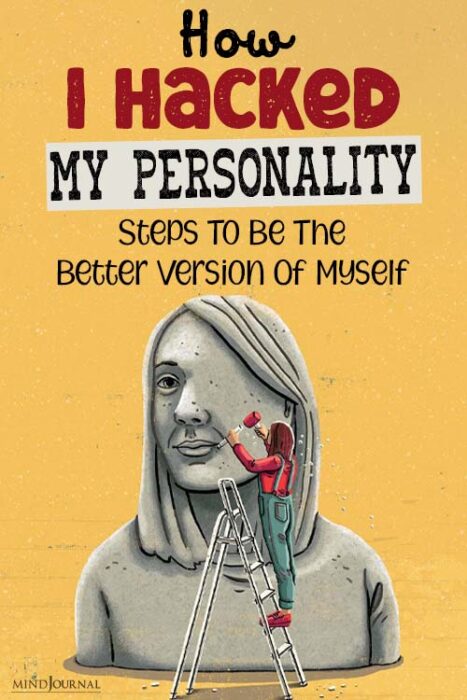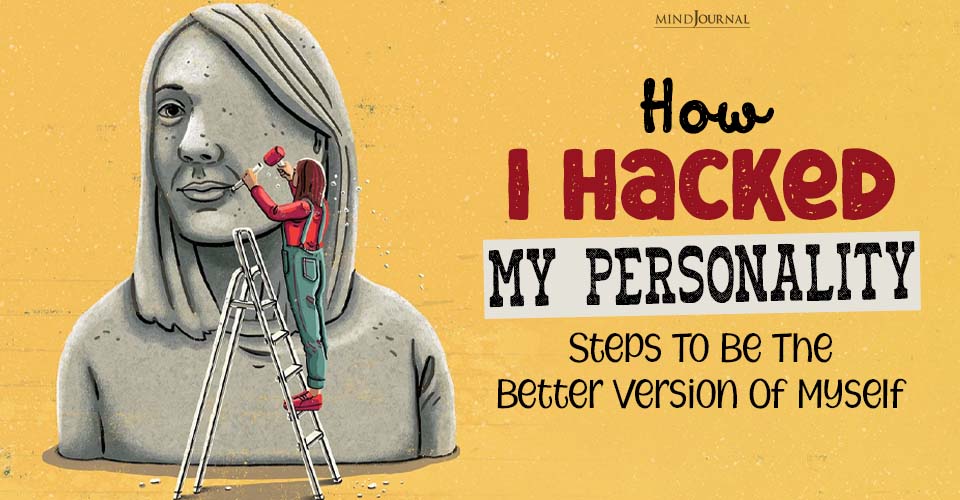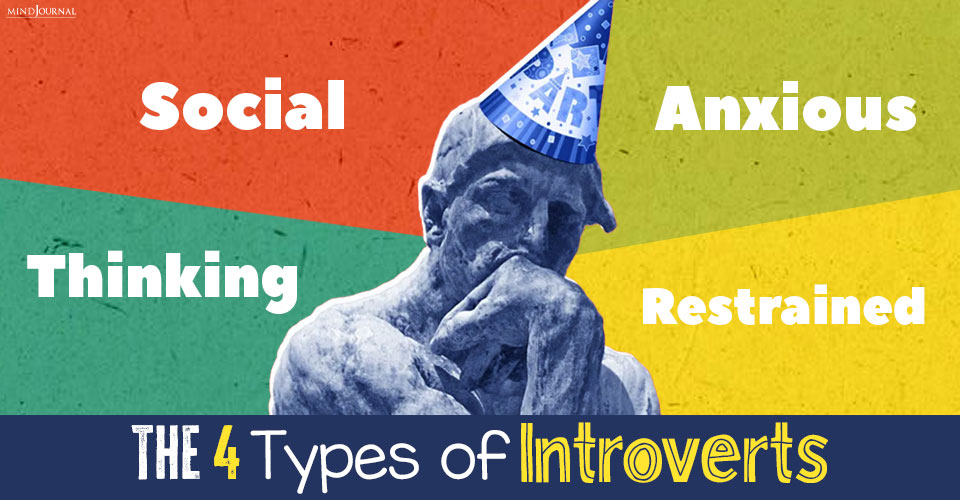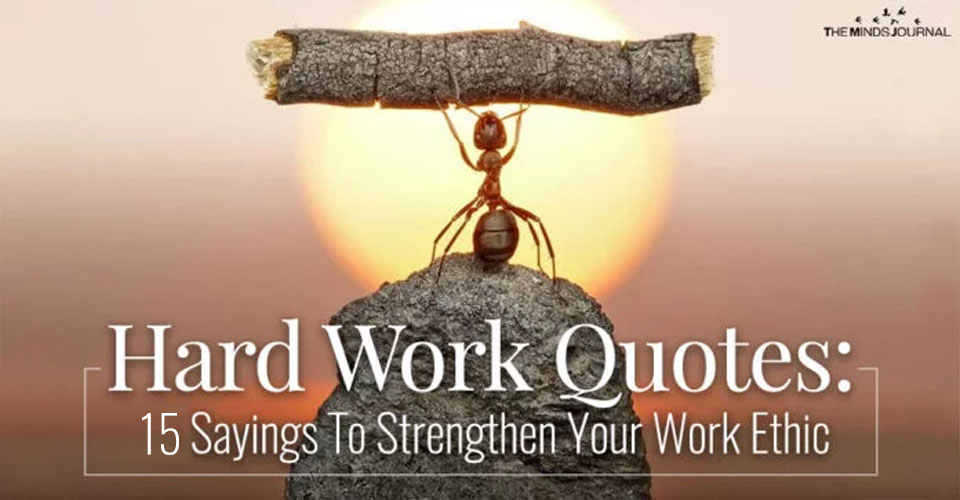We usually consider personality as a constant aspect of ourselves. But what if it’s not? With time, significant changes can be made in your thoughts, feelings, and actions. In this article, Shannon Sauer-Zavala, writes about “How I hacked my personality”, let’s learn more about this personality hack!
Key points
- Research suggests that personality changes over time.
- We can speed up personality change by taking intentional action.
- Changes that are reinforced by the environment are easier to maintain.
Here’s How I Hacked My Personality: Science-backed strategies for intentional trait change

When I tell people I used to be lazy, they don’t believe me. They think I’m being self-deprecating. They can’t square the person I am now – a successful academic – with the kid who cleaned by stuffing everything under the bed, or the high school student who rarely attended math class (and consequently had to repeat Algebra II).
How did I go from “Shannon isn’t living up to her full potential” (a common refrain in my parent-teacher conferences) to an ambitious, inbox-zero sort of person?
People are also surprised to learn I used to be shy. Now, as a university professor, I lecture in front of 200+ students and I recently gave a TEDx talk. What a far cry from the girl who rarely raised her hand in class or the teenager who sat back and observed during social events.
I can’t pinpoint any major event or milestone that set these changes in motion. Instead, adding a new behavior here and there slowly snowballed over time. In fact, I think I gradually shaped the traits I’d need to be successful in the life I wanted, instead of letting my personality dictate or limit what I could become.
Beyond my own experience watching my personality change over time, I’m a clinical psychologist and treatment development researcher with a specialty in personality change. I love telling people about my own personality change story as a way to bust the myth that traits are set in stone. (Science tells us that personality changes considerably as we age).
Read more here: The Art Of “Saving The Day”: A Simple Trick When Life Gets Crazy
From Skipping Class to Teaching It: Developing the Traits to Get Me There
Starting small ignited my journey from messy and lazy to off-the-charts in conscientiousness. As I mentioned, I was not a strong student in high school and that definitely carried over into college. In my freshman year, unclear on where to focus my studies, I took an Introduction to Psychology course that caught my eye; despite the 8 am start time, I managed to get myself out of bed to attend class.
I was rewarded by performing very well on the first exam and the teaching assistant encouraged me to “seriously consider majoring in Psychology.” I continued to work hard and perform well in this course and that affected how I thought about myself (“I’m good at psychology”), leading to continued effort in the rest of my psych classes.
I must mention that these newfound study skills were very narrowly applied only to my Psychology courses – I continued to sporadically attend my other requirements (e.g., two semesters of foreign language; biology), resulting in haphazard performance.
By my junior year, I was really feeling myself as a “budding psychologist” and decided I wanted to go to graduate to get my Ph.D. No one was more surprised than me – we actually had a speaker come to my high school to talk about her path to becoming a psychologist and, at the time, I was like “nah – too much school.”
But, hey, I was becoming more conscientious. I worked up the nerve to share this new ambition with a trusted professor and was so disappointed when she let me know I’d have trouble getting in with my low overall GPA.
Negative emotional states can be a really powerful motivator – the innate purpose of guilt is to prompt behavior change so you don’t make the same mistakes over and over again. Driven to reduce these negative feelings, I began applying myself more consistently in my non-psychology courses.
When I finally did get into graduate school, the demands increased exponentially. Feeling overwhelmed, I went to Target and bought my very first day planner (the beginning of a beautiful relationship since I now get these things customized and monogramed); scheduling out all my tasks provided a sense of relief from my overwhelming to-do list.
Anyone who’s gone to graduate school knows that rewards are few and far between. For me, as a first-generation college student who didn’t know what grad school was five years earlier, seeing my name in print at the top of a published article was a powerful signal to keep going.
Fast forward to my early years as a professor. For the first time, I was acutely aware that people were counting on me for their own professional success.
The faster I responded to emails or provided edits on their research articles, the better prepared my students were for success in their own careers.
I started to see myself through their eyes – as someone who is competent, organized, and productive – which further motivated me to live up to those standards. Years later, after I had my daughters, I learned the hard way that if you don’t book summer camp early, they’ll fill up.
One season without childcare was enough to learn that’s pretty hard to pay attention to my Zoom meeting while my girls are simultaneously putting on a unicorn DJ dance party.
That was not a mistake I was going to make twice, so I set a calendar reminder eight months in advance to sign up for camp.
Reinforcement and Identity: How Personality Change Is Maintained
There are two psychological principles that can explain how starting small (e.g., studying more for one psychology exam) can start an upward trajectory that ends in lasting personality change.
The first is reinforcement which refers to rewarding experiences that follow our behaviors, increasing the likelihood those behaviors will be repeated in the future.
This can look like adding something pleasant like having an article accepted for publication or the feeling of pride after seeing hard work pay off. It can also look like removing something negative, like how planning ahead takes away the stress of not having reliable childcare.
The other important principle at play in personality change is identity – how we see ourselves. Identity goes hand-in-hand with action. If I see myself as a person who needs the adrenaline of the last minute to start studying, I’m more likely to cram the night before.
However, if I see myself as a competent go-getter that others are counting on, I’ll probably at least try to get things done early. Cognitive strategies can help to break down rigid thinking patterns (“I don’t literally need adrenaline to start studying a week in advance; there is nothing stopping me from doing a little each day”).
A small shift in perspective can be enough to try out a new behavior and, if that behavior is reinforced, you’re likely to continue it in the future. And, if you’re behaving differently, you’re more likely to see yourself differently.
How You Can Make Meaningful Personality Changes
The steps are relatively simple.
- First, let your dreams dictate the traits you develop, not the other way around.
- Notice any self-limiting beliefs like, “I can’t do X, because I’m not X enough.” Challenge this view of yourself.
- Notice any behavior patterns that are keeping you stuck. How would a person with the trait you want act? Try that and see what happens.
- And finally, really savor the rewards you get for making these changes. It feels good and that will keep you moving forward.
Read more here: How To Talk To Anyone With Confidence? 14 Psychological Hacks For Any Situation
Unlock a new version of yourself with this personality hack. Share your thoughts in the comments below!
Dr. Shannon Sauer-Zavala is a clinical psychologist, treatment development researcher, and personality enthusiast. For daily personality facts and mental health tips, follow her on Instagram.
Written By: Shannon Sauer-Zavala Ph.D.
Originally Appeared On: Psychology Today















Leave a Reply
You must be logged in to post a comment.